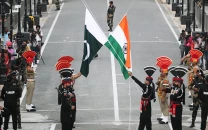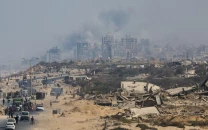Bangladesh 2.0: Renewed opportunities for Pakistan and Bangladesh
On August 5, 2024, PM Sheikh Hasina fled to India after a student-led revolution, marking the fall of the Awami League

August 5, 2024 was a significant day in the history of Bangladesh when prime minister Sheikh Hasina had to flee to neighbouring India as a result of revolutionary movement spearheaded by the students. The aftermath of her escape revealed that overthrow of Awami League’s government was not an isolated event. It was indeed the reaction by the suppressed and stifled masses against decades of tyrannical rule.
Resultantly, symbols and monuments associated with Awami League and its leadership were dismantled, defaced and destroyed. Statues of Sheikh Mujibur Rahman were demolished and his pictures and portraits were torn down. Bangladesh's International Criminal Tribunal (ICT) issued arrest warrants of 45 cabinet ministers and office bearers of Sheikh Hasina’s government for their involvement in crimes against humanity and killing of hundreds of people.
Bangladesh’s Finance Ministry has asked the Central Bank to submit new designs for all denominations of banknotes with the exclusion of Sheikh Mujib’s images. The interim government also cancelled eight national holidays related to Bangladesh’s independence and Sheikh Mujibur Rahman.
Since the ouster of Sheikh Hasina, many heart-warming developments have taken place in Bangladesh concerning Pakistan. In one such development, the 76th death anniversary of Quaid e Azam Muhammad Ali Jinnah, the founding father of Pakistan, was commemorated at the National Press Club in Dhaka on September 11, 2024, with Urdu songs and poetry.
The ceremony, first of its kind since the creation of Bangladesh, was organized by Nawab Salimullah Academy at the Tofazzal Hossain Manik Miah Hall and attended by senior retired officers of Bangladesh Armed Forces, diplomats, academics, journalists, students and prominent representatives of the civil society.
Speakers on the occasion highlighted various aspects of Jinnah’s life stressing that “Pakistan would not have been created without him, and without Pakistan, Bangladesh too would not exist.” One of the speakers went on to suggest renaming the historic Bangabandhu Avenue in Dhaka as the Jinnah Avenue.
As part of revival of ties between Pakistan and Bangladesh, several developments have taken place. In September last year, Bangladesh purchased ammunition for small arms and tanks, RDX explosives, and high-intensity projectiles from Pakistan Ordinance Factories (POF).
In October, a high ranking contingent from Bangladesh Air Force participated in a multinational (24 Nations) military exercise "Indus Shield-2024", hosted by Pakistan Air Force. The exercise besides providing training opportunities, also facilitated Bangladesh Air Force (BAF) contingent to have a closer look at the JF-17 aircraft for their possible induction into the BAF.
In early November, Pakistan’s High Commissioner to Bangladesh announced free visas under business and visit categories for Bangladeshi citizens to be processed within 48 hours. In yet an another historical development, a direct cargo ship from Pakistan docked at Bangladesh’s Chittagong port on November 11, 2024, after import restrictions on Pakistani goods were eased, signalling an unprecedented thaw in relations between the two countries. As a goodwill gesture, Bangladeshi universities are now open to Pakistani students.
During Sheikh Hasina’s rule, seeking a meeting with Bangladesh government officials was a herculean task for Pakistani diplomats. However, post August 5, 2024, there have been a number of meetings between Pakistani and Bangladeshi diplomats and leaders of the two countries.
Prime Minister Shehbaz Sharif held an exclusive meeting with Bangladesh Chief Adviser Professor Dr Muhammad Yunus on the sidelines of the UN General Assembly in New York on September 26, 2024.
Both the leaders underscored the need to revitalise bilateral cooperation between the two countries including: (i) exchange of youth programs; (ii) renewing foreign secretary-level talks; (iii) reactivating the Joint Economic Commission (JEC); (iv) commencement of direct commercial flights; (v) and sale of arms and ammunition to Bangladesh. Both sides also agreed on the need for revival of SAARC.
Historically, successive Indian governments exercised significant political influence over Bangladesh since its creation in 1971. During the last 15 years of authoritarian regime of Sheikh Hasina, India’s influence turned into interference in almost every significant decision making domain of Bangladesh.
Indian government facilitated continuation of Sheikh Hasina’s regime through rigged elections. Officials from Indian Research and Analysis Wing (RAW) remained an integral part of her advisory pool to ensure achievement of Indian objectives.
For India, diminishing influence in Bangladesh could mean enhanced internal and external security challenges especially for troubled eastern Indian states which are geographically connected with India through the 22 km narrow Siliguri corridor (the chicken neck). Such security challenges may compel India to re-orchestrate its security apparatus along 4100 km border with Bangladesh.
India’s strategic community has termed August 5, 2024 as a debacle for India. Indian political and diplomatic critics, academics and think tanks have labelled it as failure of the Indian government’s foreign policy.
Indian media has been particularly vocal to declare it as ruining of over five decades of geopolitical and geo-economic investment of India in Bangladesh. Indian media’s allegations of targeting Hindu minority in Bangladesh also did not gain traction as the Modi regime itself has been involved in committing grave human rights abuses and atrocities against minorities.
Independent international media such as Al Jazeera, reported these claims as ‘misleading and exaggerated.’ French media outlet France24 even went on to declare Indian outcry of safety of Hindus in Bangladesh as “smack of hypocrisy”.
Change of leadership in Bangladesh presents greater opportunities to establish multifaceted cooperation (people to people, business to business and government to government) between Pakistan and Bangladesh.
Building on the desire of respective leaders to open a “new page” in bilateral relations, both the countries should pursue multidomain cooperation through a comprehensive policy framework. The new era of friendship should be built on the basis of mutual respect and strong bond between the people of the two countries to foster win-win cooperation.



















COMMENTS
Comments are moderated and generally will be posted if they are on-topic and not abusive.
For more information, please see our Comments FAQ